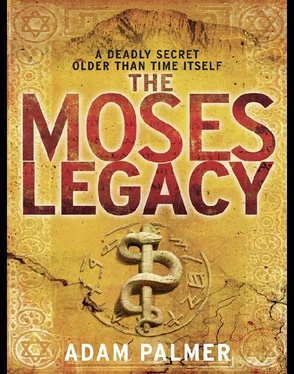Adam Palmer - The Moses Legacy
Здесь есть возможность читать онлайн «Adam Palmer - The Moses Legacy» — ознакомительный отрывок электронной книги совершенно бесплатно, а после прочтения отрывка купить полную версию. В некоторых случаях можно слушать аудио, скачать через торрент в формате fb2 и присутствует краткое содержание. Жанр: Триллер, на английском языке. Описание произведения, (предисловие) а так же отзывы посетителей доступны на портале библиотеки ЛибКат.
- Название:The Moses Legacy
- Автор:
- Жанр:
- Год:неизвестен
- ISBN:нет данных
- Рейтинг книги:4 / 5. Голосов: 1
-
Избранное:Добавить в избранное
- Отзывы:
-
Ваша оценка:
- 80
- 1
- 2
- 3
- 4
- 5
The Moses Legacy: краткое содержание, описание и аннотация
Предлагаем к чтению аннотацию, описание, краткое содержание или предисловие (зависит от того, что написал сам автор книги «The Moses Legacy»). Если вы не нашли необходимую информацию о книге — напишите в комментариях, мы постараемся отыскать её.
The Moses Legacy — читать онлайн ознакомительный отрывок
Ниже представлен текст книги, разбитый по страницам. Система сохранения места последней прочитанной страницы, позволяет с удобством читать онлайн бесплатно книгу «The Moses Legacy», без необходимости каждый раз заново искать на чём Вы остановились. Поставьте закладку, и сможете в любой момент перейти на страницу, на которой закончили чтение.
Интервал:
Закладка:
‘Actually, what really prompted me to come back here was your message about that outbreak of illness.’ He preferred not to mention what Harrison Carmichael had said about the plague at this stage. ‘Any more news on that front?’
Mansoor looked tense.
‘It’s not looking good. We’ve had four more deaths. Most of the rest are on the road to recovery. But we still don’t know what caused it and we’re having a hard time keeping the lid on it. They are foreign citizens after all.’
‘Why are you trying so hard to keep it a secret?’
Mansoor looked at Daniel as if he were an idiot.
‘My country thrives on the tourist business. Can you imagine what it’ll do to the trade if it leaks out?’
‘You’re right, I’m sorry. I just wish I understood what was causing it.’
‘We have our best doctors working on it. They’re checking dust samples from the site. They sent teams there to conduct chemical and radiological analysis, but so far they haven’t turned up anything.’
Daniel was on the verge of mentioning Carmichael’s cryptic words, when Gabrielle changed the subject again.
‘I just had a thought about what you said about the public works projects, Daniel. Could it have been found in some other public project?’
‘Like what?’ asked Mansoor. ‘A road? A bridge?’
‘Yes,’ said Gabrielle.
‘Holy shit!’ Daniel blurted out.
‘What?’ asked Mansoor, ignoring the vulgar language and latching on to Daniel’s contagious excitement.
‘I think Gaby may be on to something – sorry, Gabri elle.’ He looked at Mansoor. ‘When was the Suez Canal constructed?’
‘Between 1859 and 1869.’
‘And you said the museum moved to Boulaq in 1858?’
‘That’s right.’
‘So the jar and papyrus might have been found during the initial Suez Canal excavations.’
‘Quite possibly,’ Mansoor replied, approvingly. ‘And the chief engineer of the Suez Canal project was Linant de Bellefonds. He was a close friend of William John Bankes. He would have made sure that it was handed over to the authorities!’
‘Then we’ve cracked it!’ said Daniel, his voice rising with elation.
‘But why is that so exciting?’ asked Gabrielle, confused. ‘If it was found by workers excavating the Suez Canal?’
‘You don’t understand, Gaby. If this papyrus was found during the Suez Canal construction, then we don’t just know where it was found. I know what it is! ’
‘What?’ Mansoor and Gabrielle said in unison.
‘The Song of the Sea!’
Chapter 24
‘What could it possibly be?’ asked the consultant.
‘It’s nothing I’ve ever seen before,’ the toxicologist replied.
The curator was in an isolation unit at University College Hospital as the experts discussed and debated what he was suffering from. They had ruled out swine flu, bird flu and pretty much any other form of flu. But that didn’t tell them what it was.
They were treating him with a cocktail of antibiotics in case it was bacteriological and antipyretics to bring down the fever. They were awaiting the results of toxicology and blood sample tests and they had asked his colleagues what he had eaten and drunk recently and if any of them had experienced similar symptoms.
So far they had drawn a blank on every one of their speculations. They were further hampered by the fact that he alternated between unconsciousness and delirium, making it impossible to glean any useful information from him.
Right now, he was just emerging from unconsciousness and apparently trying to speak. They couldn’t enter the isolation chamber because that would be a contagion hazard, but there was a microphone by the bed and they were pointing to it and telling him to speak into it. He half sat up and struggled to move his lips close to it.
‘Nehu… Nehu…’
‘What’s he saying?’ asked one of the doctors.
‘It sounds like Nehu.’
‘What does that mean?’
‘I don’t know. Sounds like something in Hindi maybe.’
‘Nehushtan!’ the curator finally blurted out and then slumped back on to the pillow.
The monitoring equipment let out a high-pitched whine, warning that the patient’s vital signs had failed.
‘Nehushtan?’ one of the doctors echoed.
‘It must be a country,’ said another.
‘Why would he mention a country?’ asked the first.
‘Or a province?’ a nurse suggested.
‘You’ve heard of it?’ asked one of the doctors.
‘No, but it could be a province or a region instead of a country. Maybe it’s where he comes from.’
Meanwhile, down the corridor, a member of the hospital ancillary staff had gone to use a phone.
‘Hallo, is that the news desk? I’ve got a story that might be worth a few quid.’
Chapter 25
‘“I will sing to Jehovah for he has…” and then the next words in the Hebrew are “ Ga-ah, Ga-ah ” or “ Ga-oh, Ga-oh.” It depends on which vowels you insert and also whether you use the Sephardi or Ashkenazi pronunciations.’
Daniel was reading a biblical passage out loud, anglicizing words like Jehovah to make their meaning clear to Gabrielle.
‘In the Bible,’ Daniel explained, ‘when the same word is repeated in immediate succession, it’s for emphasis. It’s like saying “very” in English. In this case, the word itself means to triumph or achieve victory. So the repetition, “He is triumphant, is triumphant,” could be translated as “He is very triumphant,” or “He is highly triumphant.” It could even be a superlative: “He has triumphed above all.” And on the papyrus we see the word Jehovah followed by a similar repetition of a word. That’s one point of comparison.’
‘But what made you think it’s this Song of the Sea?’ asked Gabrielle.
‘It’s all a matter of location. Once you suggested that the papyrus was found in the Suez Canal excavations, it all fell into place. You see, in the Bible, the sea that parted to let the Israelites escape from the pharaoh was called Yam Suph in Hebrew. That’s usually translated as the Red Sea, but it actually means the Reed Sea or Sea of Reeds and most modern scholars believe that it was a shallow body of water in the place that today is occupied by the Suez Canal.’
‘But what exactly is the Song of the Sea?’ she pressed on.
‘Well, according to the Bible, after the Israelites crossed the Sea of Reeds, with the pharaoh’s army in hot pursuit, the waters flooded back and the Egyptian soldiers were drowned. When this happened, the Israelites were so delighted that they sang a song celebrating their escape and the destruction of their enemies. It’s called the Song of the Sea or the Song of Miriam, after Moses’ sister. When the song is described, with Moses singing it, there’s a repetition of the first verse sung by Miriam and the women – hence its alternative title. That incidentally is also the reason why Orthodox Jews insist on separating men and women in synagogues: because the women sang after the men.’
‘But why would the Song of the Sea be written on its own, if it was part of the Bible?’ asked Gabrielle. ‘And why would this copy of it be at precisely the location of the Sea of Reeds? I mean, presumably the Israelites carried on with their travels. They didn’t remain on the eastern banks of the Sea of Reeds. According to the Bible, they moved on, crossing the Sinai Desert. So why would this manuscript be there?’
‘According to modern theories about the Bible, the Song of the Sea was originally a separate work, an old poem that existed before the rest of the narrative. In fact, according to one theory, it’s the oldest text in the Bible. And this might be one of several manuscripts of the song that happened to be left at the scene. It probably described some minor event or battle that was then elevated to a greater importance.’
Читать дальшеИнтервал:
Закладка:
Похожие книги на «The Moses Legacy»
Представляем Вашему вниманию похожие книги на «The Moses Legacy» списком для выбора. Мы отобрали схожую по названию и смыслу литературу в надежде предоставить читателям больше вариантов отыскать новые, интересные, ещё непрочитанные произведения.
Обсуждение, отзывы о книге «The Moses Legacy» и просто собственные мнения читателей. Оставьте ваши комментарии, напишите, что Вы думаете о произведении, его смысле или главных героях. Укажите что конкретно понравилось, а что нет, и почему Вы так считаете.












